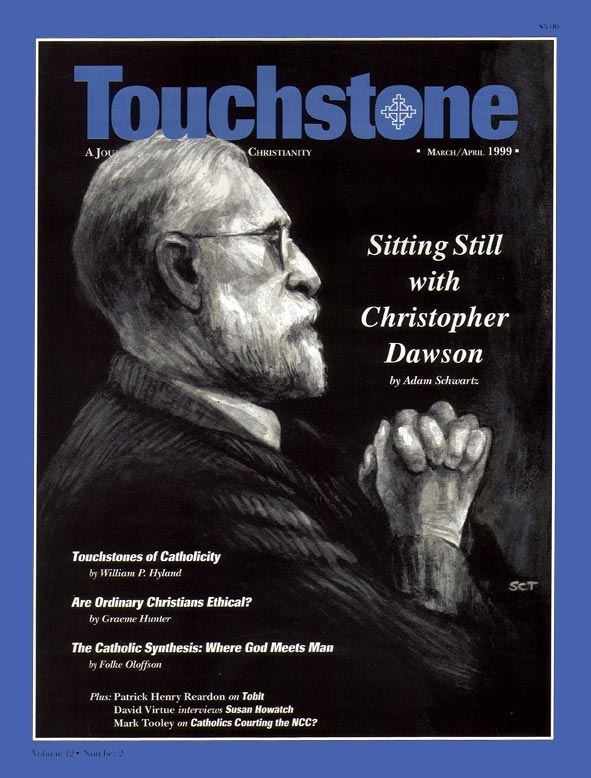Why Conservatives Can’t Win
by James M. Kushiner for the Editors
Religious and cultural conservatives are routinely labeled “mean-spirited,” “judgmental,” “overly critical,” “self-righteous,” “close-minded,” and worse simply for trying to conserve something valuable they believe they’ve been given to pass on to the following generations. These charges are inevitable when the liberal culture understands language and human discourse (“dialogue”) the way it does.
First, for the liberal culture, language is not a vehicle for truth and “dialogue” is not a way of finding the truth, because absolute truth cannot be known, and so all truth is relative. This is the death of real dialogue, which must include the possibility of coming to a final decision. If there is no truth, then every viewpoint is equally valid and entitled to speak without contradiction. Our culture insists that everyone have his say—his “place at the table”—and treats language merely as a political tool for maintaining “community” by the sharing of feelings and experiences, which are all (with a few exceptions) equally valid. Keeping everyone and every viewpoint on an equal footing is a political arrangement, a distribution of power. But this arrangement cannot allow anyone to say that any other view is wrong, because that would be seen as an attempt to deny others the equal validity of their viewpoint and thus their right to speak, and thus limit their power.
An additional effect of this relativism is that it reduces language to a way to gain power, and so liberals assume that conservatives’ claims about absolute truth are only attempts to gain and then to monopolize power over others. They must view truth-claims not only as rejections of “dialogue” but as actual offenses again human freedom.
Second, our culture closely identifies perspectives and ideas with the people who promote them. The viewpoints at the table of dialogue represent the personal experiences, stories, and perspectives of the participants. A conservative who challenges one of these viewpoints is seen as questioning the legitimacy of the personal experience behind it, and therefore attacking the person holding the view. Since for conservatives, most ideas worth defending do not arise from personal experience but have been received from tradition, they do not (or should not) take personally any attack upon any traditional idea they espouse. But this is not the approach of the liberal culture, so conservatives are routinely portrayed as launching personal attacks on others.
Third, our culture assumes that the use of power—from politically motivated rhetoric (regardless of its truth) to judicial power to the use of deadly force—lies at the base of all attempts at problem-solving. So whenever a conservative becomes “critical” or “upset,” he not only is maneuvering to gain power but also is planning to use that power to enforce his views. Liberals routinely portray conservatives as plotting within their “vast right-wing conspiracy” to force their views on everyone else. Even a person who merely speaks of absolute truth is encouraging violence by disturbing the dialogue and may even be blamed for acts of violence. Consider how James Dobson was held responsible by some in the liberal media for the murder of Matthew Shephard.
Finally, we live in a culture of victimhood. Victims of whatever oppression is currently fashionable—and their defenders—are the only ones in our culture who are allowed to get upset with impunity, as James Hitchcock has pointed out. Victims are allowed to manipulate and distort language to “empower” themselves and to use forcible, even violent measures to redistribute power in their favor because their anger is considered righteous and their cause just. Since conservatives do not accept the culture of victimhood, they don’t avail themselves of such methods. Still, when conservatives sound upset about a matter of justice or truth, liberals assume that they are angry and liable to commit extreme acts to get their way.
Conservatives who have been looking for some kind of victory in the “culture wars” are bound to be frustrated and confused about how to respond. Granted, some Christians have already capitulated to the cultural corruption of discourse, and to them, any insistence on solid and enduring truths sounds harsh, unloving, and “divisive.” Others are now tempted to whine about the unfairness of things and sullenly withdraw as depressed refugees from the “culture wars.”
Can Christians withdraw and mute their consciences as they are informed by tradition? Should we not be “upset” at the destruction of millions of innocent children in the womb? Within our churches, should we not be “critical” if we honestly believe that certain innovations will subvert the godly order of the church, undermine the Creed, corrupt the Christian imagination, and do harm to the flock?
The tradition that the mere Christian has received from his Lord is always to speak truth to power, for the love of God and his truth and for the love of neighbor. Mother Teresa of Calcutta clearly spoke the truth about the evil of abortion to President Clinton at a National Prayer Breakfast several years ago. Anger was not needed, only articulate words and a passion for the truth and for the unborn.
Power, whether that of the “liberal” state or a despotic emperor, does not easily retreat before the truth. When speaking truth to power, Christians should expect the same incomprehension that Pilate expressed to the One who is Truth. What is truth next to power? An apparent loser, for power will silence or destroy the one who speaks the truth.
James M. Kushiner is the Director of Publications for The Fellowship of St. James and the former Executive Editor of Touchstone.
subscription options
Order
Print/Online Subscription

Get six issues (one year) of Touchstone PLUS full online access including pdf downloads for only $39.95. That's only $3.34 per month!
Order
Online Only
Subscription

Get a one-year full-access subscription to the Touchstone online archives for only $19.95. That's only $1.66 per month!
bulk subscriptions
Order Touchstone subscriptions in bulk and save $10 per sub! Each subscription includes 6 issues of Touchstone plus full online access to touchstonemag.com—including archives, videos, and pdf downloads of recent issues for only $29.95 each! Great for churches or study groups.
Transactions will be processed on a secure server.
more from the online archives
calling all readers
Please Donate
"There are magazines worth reading but few worth saving . . . Touchstone is just such a magazine."
—Alice von Hildebrand
"Here we do not concede one square millimeter of territory to falsehood, folly, contemporary sentimentality, or fashion. We speak the truth, and let God be our judge. . . . Touchstone is the one committedly Christian conservative journal."
—Anthony Esolen, Touchstone senior editor









